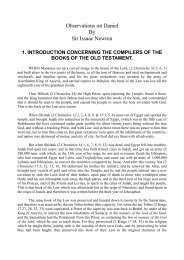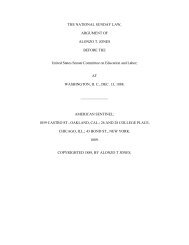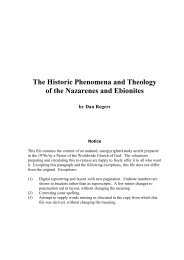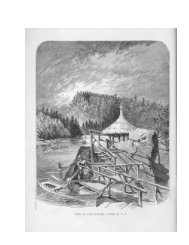THE EARLY CHRISTIAN SABBATH - Friends of the Sabbath Australia
THE EARLY CHRISTIAN SABBATH - Friends of the Sabbath Australia
THE EARLY CHRISTIAN SABBATH - Friends of the Sabbath Australia
Create successful ePaper yourself
Turn your PDF publications into a flip-book with our unique Google optimized e-Paper software.
The Early Christian <strong>Sabbath</strong><br />
and again afterward (Mat<strong>the</strong>w 28:18). Later, apparently that day, Peter saw Him. 1<br />
Corinthians 15:5. Late in <strong>the</strong> day two <strong>of</strong> <strong>the</strong> disciples <strong>of</strong> Jesus, not <strong>of</strong> <strong>the</strong> twelve, were<br />
walking from Jerusalem back to <strong>the</strong>ir home village <strong>of</strong> Emmaus, about seven and a half<br />
miles from Jerusalem. As <strong>the</strong>se men walked along, talking about Christ's death and <strong>the</strong><br />
rumors concerning His “disappearance” from <strong>the</strong> tomb, <strong>the</strong>y were joined by a third<br />
person, whom <strong>the</strong>y did not <strong>the</strong>n recognize. He discussed with <strong>the</strong>m <strong>the</strong> prophecies <strong>of</strong> <strong>the</strong><br />
Old Testament concerning <strong>the</strong> Messiah. He pointed out from prophecy <strong>the</strong> kind <strong>of</strong><br />
Messiah <strong>the</strong> Jews should have been expecting. Luke 24:25-27. Arriving at <strong>the</strong>ir home in<br />
Emmaus, <strong>the</strong> two disciples invited <strong>the</strong> stranger to have supper with <strong>the</strong>m. As <strong>the</strong>y sat<br />
down to eat, and <strong>the</strong> visitor <strong>of</strong>fered thanks, <strong>the</strong>y recognized Him as <strong>the</strong>ir risen Master.<br />
Immediately He withdrew from <strong>the</strong>m. They set out at once to tell <strong>the</strong> disciples that <strong>the</strong>y<br />
had actually been with <strong>the</strong> risen Jesus. They found <strong>the</strong>ir companions in an upper room,<br />
“assembled for fear <strong>of</strong> <strong>the</strong> Jews.” John 20:19. By <strong>the</strong> time <strong>the</strong> two disciples arrived, it<br />
was evening, evidently after sundown <strong>of</strong> <strong>the</strong> first day <strong>of</strong> <strong>the</strong> week. Technically, according<br />
to current reckoning, it was <strong>the</strong> “eve,” or beginning, <strong>of</strong> <strong>the</strong> second day <strong>of</strong> <strong>the</strong> week. To<br />
save confusion in <strong>the</strong> record, and in reference to <strong>the</strong> pressing events <strong>of</strong> <strong>the</strong> day just<br />
closing, it is called “<strong>the</strong> same day at evening, being <strong>the</strong> first day <strong>of</strong> <strong>the</strong> week!'<br />
While <strong>the</strong>se two men told <strong>of</strong> <strong>the</strong>ir conversation with Jesus, Christ Himself<br />
appeared in <strong>the</strong> midst <strong>of</strong> <strong>the</strong> disciples, and talked with <strong>the</strong>m. It must be noted definitely<br />
that here was no divine appointment. It was not a meeting for worship. It was not an<br />
observance <strong>of</strong> <strong>the</strong> first day <strong>of</strong> <strong>the</strong> week; nor <strong>the</strong> institution <strong>of</strong> first-day sanctity. It<br />
furnishes no precedent for Sunday observance. The disciples were ga<strong>the</strong>red <strong>the</strong>re 1or fear<br />
<strong>of</strong> <strong>the</strong> Jews,” not expecting to see Christ, and not even yet believing that He had risen.<br />
They were not yet ready to believe <strong>the</strong> glorious fact <strong>of</strong> <strong>the</strong> resurrection. In fact, a week<br />
later, when Jesus met with His disciples again, Thomas was still unready to admit his<br />
belief that Jesus had risen, and did not do so until Jesus addressed Himself to him<br />
individually and showed Thomas His wounded hands and side.<br />
It was evidently for Thomas's sake that Jesus came to <strong>the</strong> disciples at this time. It<br />
certainly was not to make <strong>the</strong> day <strong>of</strong> <strong>the</strong> sun a sacred day. Jesus gave not <strong>the</strong> slightest<br />
intimation that it was His intention to set aside <strong>the</strong> first day <strong>of</strong> <strong>the</strong> week for special<br />
observance. What is more,-and note this,-John, who wrote this Gospel some sixty years<br />
after <strong>the</strong> event ' , when Christianity had already begun to spread and crystallize its<br />
observances, did not mention Sunday as in any way sacred. If <strong>the</strong> church were already<br />
keeping Sunday by <strong>the</strong> time <strong>of</strong> John's death, as some claim, how could he have written<br />
his Gospel late in life, as he did, and fail to mention, at this point, that this is why Sunday<br />
was kept? This he failed to do, and it is obvious why-Sunday was not observed by <strong>the</strong><br />
church when John wrote his Gospel. The silence is significant indeed.<br />
We have mentioned that <strong>the</strong> Sacred Record in four separate places clearly<br />
describes Paul as keeping <strong>the</strong> <strong>Sabbath</strong>. He never kept Sunday, but let us see what he did<br />
do. While he was on his way to Jerusalem at <strong>the</strong> close <strong>of</strong> his third missionary journey,<br />
<strong>the</strong>re occurred a meeting which is sometimes put forward as an example <strong>of</strong> Sunday<br />
keeping. The record is in Acts 20. Paul stopped at <strong>the</strong> town <strong>of</strong> Troas to meet with <strong>the</strong><br />
believers <strong>the</strong>re, and he spent a week with <strong>the</strong>m. At <strong>the</strong> conclusion <strong>of</strong> this sojourn it was<br />
his plan to walk across country to <strong>the</strong> seaport to meet his companions who had gone<br />
around <strong>the</strong> point <strong>of</strong> <strong>the</strong> peninsula by ship, in order that he might proceed to Jerusalem to<br />
fulfill certain vows which he was to accomplish <strong>the</strong>re. The record says that on <strong>the</strong> first<br />
12

















